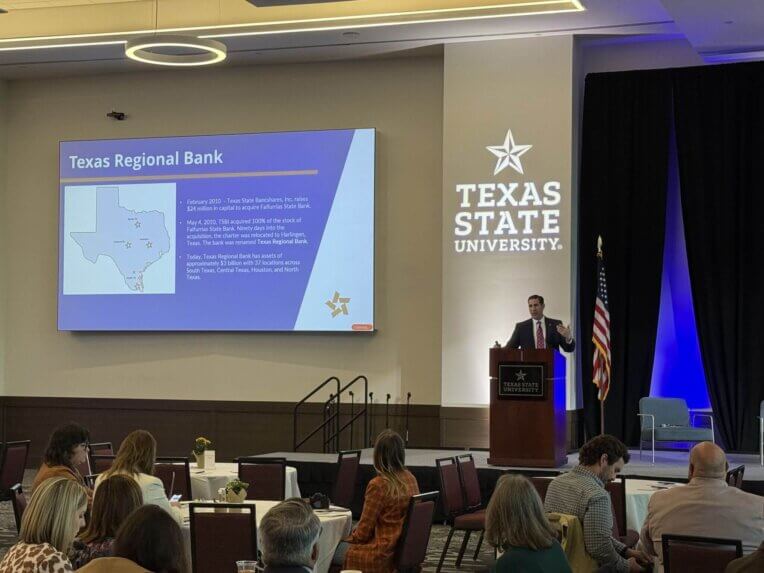Key Takeaways:
- Education is one of the most effective defenses against these dangers, and ‘The People You Know’ at Texas Regional Bank (TRB) are taking a proactive role in educating customers and clients how to identify and prevent fraud before it happens.
- TRB identified one fraud case per day last year alone among its customers—an unfortunate statistic that is predicted to continue.
- In authorized push payment fraud, a person is tricked into authorizing a payment to an account that they believe belongs to a legitimate payee, but in reality, it belongs to a scammer.
- To avoid push payment fraud, pick up the phone and call a trustworthy number, verify payment details with the vendor, and do not trust every link that arrives in your email inbox.
Education Can Save You from Financial
Fraud
It’s no secret financial fraud is becoming more sophisticated, with scammers using more advanced tactics to deceive businesses and individuals alike. As technology continually evolves so do the threats to your financial and personal information, making it critical for you to stay vigilant. Education is one of the most effective defenses against these dangers, and ‘The People You Know’ at Texas Regional Bank (TRB) are taking a proactive role in educating customers and clients how to identify and prevent fraud before it happens. From authorized push payment fraud to phishing scams, risks in the financial sector are growing, read on for practical advice to help safeguard your financial assets and personal information.
Education is The First Line of Defense
In today’s digital world, the criminal trying to take advantage of you, your business, and your hard-earned savings is only a keystroke away. One of the scariest aspects to realize is that many times, it’s your very own keystroke that allows scammers into your life.
“Education is the first and most important line of defense against fraud,” explained Brad Freudenberg, Chief Technology Officer of TRB, which partners with clients to offer information and support to help secure their finances.
It’s that education that can save both life savings and companies, he noted, explaining that TRB identified one fraud case per day last year alone among its customers—an unfortunate statistic that he predicts is likely to continue to rise. Case in point: The Federal Trade Commission reported fraud losses increased by more than 30% over 2021, resulting in $8.8 billion in losses reported by consumers in 2022.
Businesses are Targets for Authorized Push Payment Fraud
Business owners are constantly seeking to increase efficiency, and they often turn to technological tools to maximize their efficiency.
Receiving an email from a vendor with a link to pay an invoice online can be faster than writing a check and sending payment through postal mail. While often used legitimately, the practice of sending digital payments through online services – though efficient and convenient – has created an opportunity for scammers to become an unseen and devastating part of your business.
“This is where the customer initiates fraudulent activity unknowingly,” Esli Campos, Security and Fraud Officer for TRB, said. “One of the scariest aspects is that this is often big dollars.”
Authorized push payment (or “APP”) fraud occurs when a person is tricked into authorizing a payment to an account that they believe belongs to a legitimate payee, but in reality, it belongs to a scammer. This fraud can involve social engineering tactics, such as impersonation scams or phishing emails, where fraudsters manipulate individuals into transferring money under false pretenses.
Many times, Campos said, this scam begins with an email hack, which grants the criminal access to communication between you, your business associates, your vendors and your clientele.
Sophisticated criminals get to know you and your business’s processes and wait for the right time to strike – say, for example, when you would typically expect an invoice from a vendor.
But instead of receiving the invoice from the actual vendor, the person targeted receives an invoice from an email account that may even appear to look legitimate. There is a link to click and pay, and you do. “Many times, people don’t realize until their vendor calls and says they never received the payment,” Campos explained.
Your community bankers at TRB can assist in keeping you safe and securing your financial assets. Always call ‘The People You Know’ if you suspect your financial accounts may be at risk.
How to Avoid Becoming a Victim
“One of the best ways you can avoid push payment fraud is to pick up the phone and verify payment details with your vendor,” Campos said. “We preach to customers not to rely solely on the email that you received.” While today’s professional and personal lives both move quickly, it’s important to take the time to really look at what is being sent to us, who is asking for payment, and what do links look like before clicking on them or paying them, Campos emphasized. “Unfortunately, we cannot trust every link that arrives in our email box. We have to be vigilant.”
Exercise caution when sharing sensitive information online and be wary of unsolicited communications requesting personal or financial details. Employing strong, unique passwords and regularly updating them can also thwart attempts to gain unauthorized access to accounts. Also, take advantage of two-factor authentication when offered to help provide an additional layer of security.
Education, vigilance, and secure practices are the keys to protecting personal and commercial financial assets. From understanding the risks of authorized push payment fraud to recognizing phishing schemes, being aware of the warning signs can make all the difference. ‘The people you know’ at TRB can assist you in combatting these threats. By staying informed and cautious, individuals and businesses can take proactive steps to secure their financial future in a world of increasingly digital fraud threats.
For more tips on cybersecurity and fraud prevention, visit the Security Archives – Texas Regional Bank.






